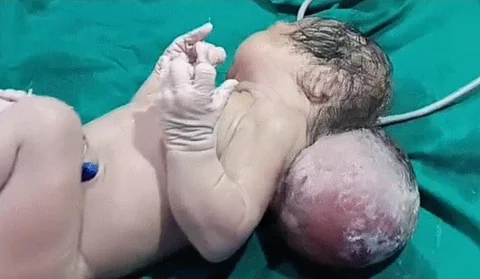Health
Newborn in Assam Denied MRI Due to Faulty Equipment

A newborn girl from Assam’s Cachar district, diagnosed with a rare congenital deformity, is facing significant delays in necessary medical treatment due to malfunctioning equipment at Guwahati Medical College and Hospital (GMCH). Born on July 1, 2023, at a private hospital near Kathal Point in Silchar, the infant has been identified with meningoencephalocele, a birth defect where brain tissue extends through an opening in the skull.
Medical professionals in Silchar referred the child to GMCH for specialized care, given the complexity of her condition. However, her father, Makbul Hussain Choudhury, a daily wage mason from the Dholai constituency, has expressed frustration over the hospital’s inability to provide timely treatment. He reported that a crucial MRI scan was postponed because the specialized oxygen support system for neonatal MRIs had been non-functional for 20–25 days.
“We reached Guwahati for the second time on July 22. But the MRI couldn’t be done because the oxygen system wasn’t working. They discharged us and gave us a new date — August 25,” Makbul stated.
With no local hospitals willing to handle such a complex case and medical experts in Silchar indicating a lack of necessary infrastructure, the family finds themselves stranded in Guwahati. The financial burden is mounting, as the family of four now spends approximately Rs 500–600 per meal, a cost that Makbul struggles to sustain. “I’m just a mason. We have no more resources. I request the Chief Minister to help save my daughter,” he pleaded.
Local MLA Nihar Ranjan Das has reportedly provided limited financial assistance, but the father’s appeal for help has garnered public attention and concern. This incident raises serious questions about the preparedness of premier government hospitals like GMCH in addressing rare and urgent neonatal cases.
The ongoing failure to repair the neonatal MRI system underscores systemic deficiencies in Assam’s healthcare infrastructure, which could have dire consequences for patients. As the situation stands, the baby’s health remains precarious, with the family anxiously awaiting both medical clarity and government support.
The case highlights the urgent need for improvements in medical facilities to ensure timely and effective healthcare for vulnerable populations, particularly newborns facing life-threatening conditions.
-

 World4 months ago
World4 months agoSBI Announces QIP Floor Price at ₹811.05 Per Share
-

 Lifestyle4 months ago
Lifestyle4 months agoCept Unveils ₹3.1 Crore Urban Mobility Plan for Sustainable Growth
-

 Science3 months ago
Science3 months agoNew Blood Group Discovered in South Indian Woman at Rotary Centre
-

 World4 months ago
World4 months agoTorrential Rains Cause Flash Flooding in New York and New Jersey
-

 Sports3 months ago
Sports3 months agoBroad Advocates for Bowling Change Ahead of Final Test Against India
-

 Top Stories4 months ago
Top Stories4 months agoKonkani Cultural Organisation to Host Pearl Jubilee in Abu Dhabi
-

 Science4 months ago
Science4 months agoNothing Headphone 1 Review: A Bold Contender in Audio Design
-

 Top Stories4 months ago
Top Stories4 months agoAir India Crash Investigation Highlights Boeing Fuel Switch Concerns
-

 Sports3 months ago
Sports3 months agoCristian Totti Retires at 19: Pressure of Fame Takes Toll
-

 Business4 months ago
Business4 months agoIndian Stock Market Rebounds: Sensex and Nifty Rise After Four-Day Decline
-

 Politics4 months ago
Politics4 months agoAbandoned Doberman Finds New Home After Journey to Prague
-

 Top Stories4 months ago
Top Stories4 months agoPatna Bank Manager Abhishek Varun Found Dead in Well









